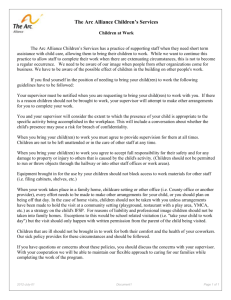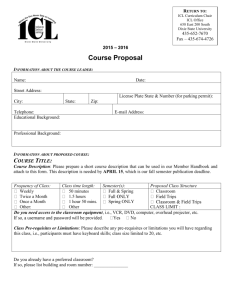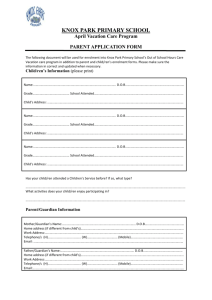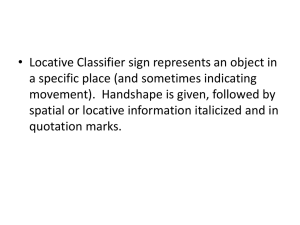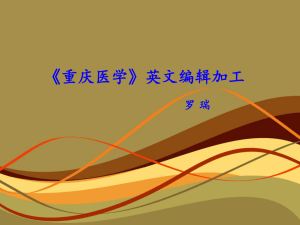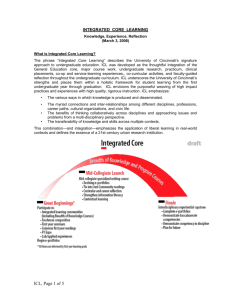Initial Letter To Parents - Independent Childrens Lawyers
advertisement
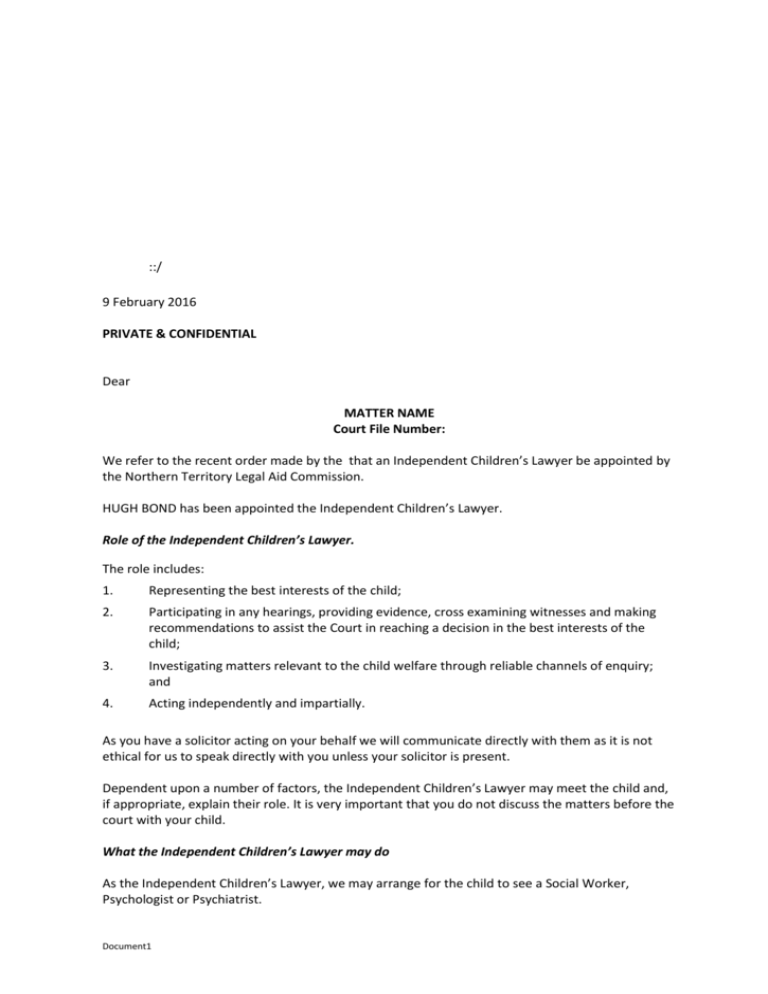
::/ 9 February 2016 PRIVATE & CONFIDENTIAL Dear MATTER NAME Court File Number: We refer to the recent order made by the that an Independent Children’s Lawyer be appointed by the Northern Territory Legal Aid Commission. HUGH BOND has been appointed the Independent Children’s Lawyer. Role of the Independent Children’s Lawyer. The role includes: 1. Representing the best interests of the child; 2. Participating in any hearings, providing evidence, cross examining witnesses and making recommendations to assist the Court in reaching a decision in the best interests of the child; 3. Investigating matters relevant to the child welfare through reliable channels of enquiry; and 4. Acting independently and impartially. As you have a solicitor acting on your behalf we will communicate directly with them as it is not ethical for us to speak directly with you unless your solicitor is present. Dependent upon a number of factors, the Independent Children’s Lawyer may meet the child and, if appropriate, explain their role. It is very important that you do not discuss the matters before the court with your child. What the Independent Children’s Lawyer may do As the Independent Children’s Lawyer, we may arrange for the child to see a Social Worker, Psychologist or Psychiatrist. Document1 9 February 2016 The Court may order the preparation of a Family Report and arrangements for this will be made by the Court staff directly with you. We enclose: 1. Fact Sheet entitled “the Role of the Independent Children’s Lawyer” which will provide additional information concerning the role of Independent Children’s Lawyer, and 2. Notice of Commonwealth Guidelines in relation to the Independent Children’s Lawyer’s costs. 3. We have also sent to your solicitor a questionnaire for you to complete which will assist in the representation of the child together with some authorities. Please fill in the questions to the best of your knowledge and return to your solicitor as soon as possible. Yours faithfully LAWYER Barrister & Solicitor Enc Notice of Commonwealth Guidelines in relation to the Independent Children’s Lawyer’s costs Fact Sheet “Role of the Independent Children’s Lawyer” 2 Guideline 3 Separate Representation of Children 3.1 Assistance for Separate Representation of a Child (1) The Commission may make a Grant of Legal Assistance for the separate representation of a child in court proceedings if: (a) A court makes an order for separate representation and asks the Commission to arrange for a child representative to provide the separate representation; and (b) The Commission decides that it is reasonable to provide a Grant of Legal Assistance for the separate representation. Note: A court order that a child representative be appointed in a matter does not impose an obligation on the Commission to make a Grant of Legal Assistance for the separate representation. (2) The Commission should make a Grant of Legal Assistance for the separate representation of a child in any court proceedings relating to special medical procedures (including sterilisation). (3) An application for a Grant of Legal Assistance under this guideline 3.1 is not subject to the means test. 3.2 Payment for the Costs of Separate Representation by a Party not receiving Legal Assistance (1) If the Commission makes a Grant of Legal Assistance for the separate representation of a child in court proceedings in relation to which at least one of the parties is not receiving legal assistance under a Grant of Legal Assistance, the Commission must: (a) Notify each party not receiving legal assistance that each may be required to pay an equal portion of the total costs and disbursements of the child representative; (b) Taking into account each such party's capacity to pay, determine whether to waive or reduce the amount to be paid by that party, and notify each such party of the amount he or she is required to pay the Commission; and (c) Require each such party to pay the required amount in the manner determined by the Commission. (2) Guideline 3.2(1) does not apply to proceedings relating to special medical procedures involving a child in which a Grant of Legal Assistance for separate representation of the child has been made, regardless of whether or not any of the parties to the proceedings are receiving legal assistance under a Grant of Legal Assistance. (3) If a party refuses or fails to pay the amount required by the Commission under this guideline 3.2, legal assistance for the separate representation should continue to be provided on the condition that the child representative seek an order for costs against that party at an appropriate time in the court proceedings. 2 FACT SHEET THE ROLE OF AN INDEPENDENT CHILDREN’S LAWYER What is an Independent Children’s Lawyer (ICL)? Present evidence to the court, including calling witnesses. Recommend which Court Orders would be in the child/ren’s best interests. The ICL is an independent solicitor whose appointment is ordered by the Family Court or Federal Circuit Court during family law proceedings where there is a dispute involving children. The Northern Territory Legal Aid Commission makes the appointment. What is a Family Report? A Family Report is a written report about the family’s situation and will also include the child/ren’s views (if old enough to express them), emotional attachments and recommendations to the Court about arrangements for the children. These reports are generally written by someone who has qualifications of a social worker, psychologist or can sometimes have a background as a psychiatrist to help the Court understand the family situation. The report is written on information received by the writer speaking to the family members and other significant people (eg, teachers and other professionals) as well as the child/ren and access to Court documents. The Court can be asked by the ICL or any of the parties involved to make an order for this report which can be organised and paid for by either the parties or the ICL. Sometimes the Court will order Court appointed expert to do it. This usually happens when there is a concern about the child’s welfare because the Court’s main focus is the welfare and well-being of the child/ren when making orders about their future arrangements. What does the Independent Children’s Lawyer do? The ICL must: Based on the evidence in the case, form their own independent view about child/ren’s welfare and best interests. Introduce themselves to the child/ren and explain their role if the child/ren is/are mature and old enough, unless there are special circumstances. Make the Court aware of any views the child/ren may have expressed and any important issues concerning the child/ren. Help lessen any trauma to the child/ren caused family law case and help everyone in the case to come to an agreement about what is the child/ren’s best interests. Will I be involved in the process? The ICL may arrange a Family Dispute Resolution Conference to discuss the issues. This will involve you and your former partner, solicitors and the ICL. This conference can often solve disputes and avoid the need for a Court hearing. The ICL will present evidence to the Court of your child/ren’s views (if old enough to express them) and other evidence they consider to be important in working out what is in their best interests. So your child/ren’s views may not always be followed. The ICL will communicate with you during the case. Although if you are legally represented, the ICL will not be able to talk to you directly but with your solicitor. The ICL does not act on the children’s instructions like a party’s solicitor would or do what the child/ren ask. How will the Lawyer do this? Independent Children’s Request a Family Report be prepared (see “What is a Family Report”). Collect information about the child/ren or the case and speak to other people involved with the child/ren such as teachers, doctors, counsellors, Guidance Officers and psychologists. What happens at Court? 3 If the matter goes to a Court hearing, your child/ren will not be required to go to Court to give evidence. Any information the Court needs will be found in the various Court documents filed and evidence of the parties and reports prepared by experts, such as the Family Report writer. Do not discuss the court case with them because it can be very stressful for your child/ren. Support and confidentiality. Make the child/ren available to see the ICL if requested and give the ICL requested information and authorities to speak to those involved with your child/ren such as school teachers, Guidance Officers and doctors. Does the Judge do what the Independent Children’s Lawyer asks? respect your The ICL will give the Judge an independent view of the case and will be listened to by the Judge. Your contact with the Independent Children’s Lawyer The Judge takes into consideration all facts and views which are given by all the parties including the child/ren. Who finds out what the Independent Children’s Lawyer recommends? The ICL may make a recommendation about what they consider is in the child/ren’s best interests early in the case and will communicate this to the parties’ solicitor or the parties directly, if they don’t have a solicitor. The reason for this is so the parties can consider these recommendations and try and resolve the dispute. Sometimes the ICL may not make any recommendations until they’ve heard all the evidence given by parties and all the witnesses during the court hearing. The ICL may even change their recommendations if new evidence or information becomes available to them. What can I do to help? It is important that you: Do not question the child/ren before or after any meetings with the Family Report writer or ICL; Do not coach them in what to say. child/ren’s The ICL will communicate with you during the case, usually in writing and sometimes by telephone. Although if you are legally represented, the ICL will not be able to talk to you directly but through your solicitor. What happens after Final Court Orders are made? Once a final decision and orders are made by the Court, the ICL’s role ends and the ICL will be discharged by the Court. Who pays the Independent Children’s Lawyer? Normally the Northern Territory Legal Aid Commission pays the costs of the ICL but may ask the parties to contribute one-half each towards those costs. The Northern Territory Legal Aid Commission may also direct the ICL to ask the Court for their costs to be paid by the parties at the end of the case. The financial capacity of the parties to pay these costs will be assessed by the Northern Territory Legal Aid Commission. If a party is, for eg. legally aided, they will not be required to make a contribution towards the ICL’s costs. Northern Territory Legal Aid Commission Offices Darwin Office 6th Floor, 9 – 11 Cavenagh Street Darwin NT0801 Tel: (08) 8999 3000 Fax: (08) 8999 3099 Palmerston Office 4 Shop 6 Goyder Centre, 25 Chungwah Terrace Palmerston NT 0830 Tel: (08) 89994750 Fax: (08) 8999 4747 Katherine Office 20 Second Street Katherine NT 0850 Tel: (08) 8973 8704 Fax: (08) 8973 8551 Tennant Creek Office Shop 3, 163 Paterson Street Tennant Creek NT 0860 Tel: (08) 8962 4362 Fax: (08) 8962 2439 Alice Springs Office 77 Hartley Street Alice Springs NT 0870 Tel: (08) 8951 5377 Fax: (08) 8951 5378 Email: mailto:info@ntlac.nt.gov.au Toll free Telephone Information Service: 1800 Monday to Friday 9am to 4 pm 019 343 5
